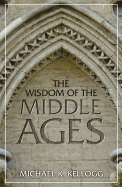
In his introduction to The Wisdom of the Middle Ages, lawyer and writer Michael K. Kellogg (The Roman Search for Wisdom) notes that "the Middle Ages were a time very much like the present, and we have a great deal to learn from the efforts of medieval thinkers and writers to give shape and meaning to their experience." Europeans were struggling with the disintegration of the Roman Empire, the rise of the Catholic Church and the founding of nation-states. Kellogg offers a clear, competent summary of the origins of Christianity, the history of the European Middle Ages and the period's great literary, theological and philosophical works. He organizes this around his reading of the New Testament and a selection of significant authors: Saint Augustine, Boethius, the Beowulf poet, Abelard and Héloïse, Chrétien de Troyes, Saint Francis, Saint Thomas Aquinas, Dante, Boccaccio and Chaucer.
Kellogg chose these examples, as in his previous books, because they are "works that enrich our lives through their intellectual distinction, beauty of expression, and implicit or explicit wisdom." This is a lot of material to cover in one short volume. Kellogg does not go into great depth and his quotes from the works are brief. For readers who are inspired to read more about the Middle Ages or these works, he provides substantial notes, a chronology and suggestions for further reading organized by author. Anyone looking for an overview of the period or concise summaries of the major works that Kellogg considers will find this useful. --Sara Catterall

